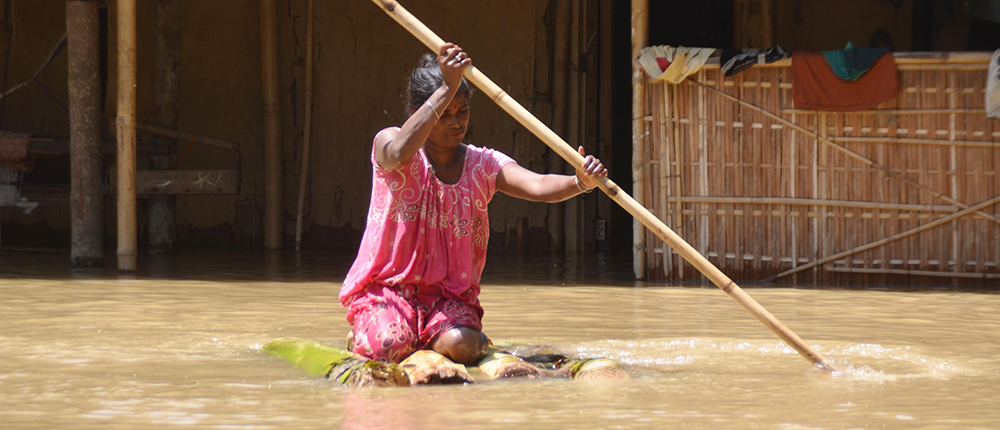The COVID-19 pandemic could be seen as a forewarning of the other under-addressed global disasters which looming on the horizon, particularly those brought on by climate change. The onset of climate change impacts along with the climate-related natural disasters are an even bigger threat to public welfare and health than the ongoing pandemic.

It took a pandemic to expose the fundamental weaknesses and lack of preparedness in the existing healthcare system worldwide, and especially in India. It has led to human tragedy on an unimaginable scale. For the past several years many scientists have been issuing warnings on the eventuality of pandemics and the need to prepare appropriate healthcare and management responses, which went unheeded.
The COVID-19 pandemic could be seen as a forewarning of the other under-addressed global disasters looming on the horizon, particularly those brought on by climate change. The onset of climate change impacts along with the climate-related natural disasters are an even bigger threat to public welfare and health than the ongoing pandemic. Climate change is expected to have a long-term and persistent adverse impact on livelihoods and many key economic sectors. To avoid being once again caught at a point where developing countries like India have to make hard choices between their economic growth and public welfare, the importance of understanding potential climate change impacts and being prepared in advance cannot be emphasized enough.
In the Global Climate Risk Index 2021, India ranked as the 7th most affected country with the highest absolute losses in terms of purchasing power parity in 2019. The climate risk is also seen by the Indian government - a 2020 Ministry of Earth Sciences study projected increasingly intense and variable monsoons, heat stress, and extreme weather events. The study concluded that these will highly impact human health and well-being, and damage the country's critical ecosystems and infrastructure. The question that arises is, are we doing enough in the present to cope in the future?
Remarkably, till 2020, India was the only country among the G20 countries that had 2-degree compatible climate commitments. Even though India's per capita carbon footprint is a small fraction of the global average, the country has set itself ambitious climate and energy targets. India is also taking the lead in mobilising other countries for implementing climate interventions, through the two international initiatives it anchors - the International Solar Alliance and the Coalition for Disaster Resilient Infrastructure. While India's climate actions have largely focused on the energy sector, with an increasing focus recently on the transportation sector, it is now imperative for India to develop roadmaps for transitioning to low-carbon resilient pathways for manufacturing industries, critical infrastructure, urban habitats, agriculture, and for development in coastal and mountainous regions.
As in the case of the pandemic, it is critical to take scientific expertise into account while determining climate events and devising a coping response. It is also essential to have an institutional framework in place which allows for inter-agency and inter-state decision-making, as well as international cooperation for sharing resources and expertise. Most importantly, there is a need for tools to enable transparency and communicate the ground reality, in terms of preparedness and impacts, to the general public.
With the US re-entering the Climate Accord following President Joe Biden's election victory, international cooperation for climate change has started to ramp up. At the US Leadership Climate Summit held in mid-April, the US announced its intent to double its climate finance flows by 2024 and tripling its adaptation finance, largely focused on climate-smart development and sustainable infrastructure for developing nations. This has opened up possibilities of the US engaging with its partner countries to provide enhanced financial support for addressing climate change. It is already actualising to support India's endeavours, as, at the same Summit, India’s Prime Minister Narendra Modi announced a renewed bilateral cooperation with the US for mobilising finance and accelerating clean energy deployment in the country under the Clean Energy Agenda 2030 Partnership.
Another area with overlapping focus for the two nations, and one that is essential for preparing a suitable response to climate change, is mobilizing international private finance. Private finance has been touted as a panacea for enabling ambitious climate actions, but there is very little of it existing on the ground in developing countries for sectors besides energy. Mobilizing private finance requires risk mitigation instruments for incentivizing private climate investments and buy-in and support from domestic financial institutions. India has already started conducting state-wise vulnerability assessments. These should be collated and updated in a central database and made accessible to the industries and the general public so they can start taking them into account in their decision-making.
India should increasingly capitalise on the emerging global cooperation opportunities to ensure sustainable financing for long-term climate actions, chart green recovery pathways and frame a suitable response for climate emergencies. Instead of joining the 'net-zero' race at the cost of its development, India should now focus on putting forth implementable and increasingly ambitious climate actions for key sectors. Critically, India should create a supportive enabling environment through policy measures, so that a diverse range of actors can participate in the national endeavour of transitioning to a low-carbon, climate resilient growth pathway.
